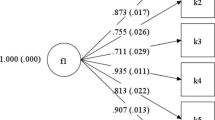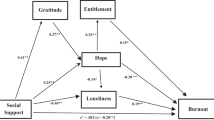Abstract
The KidCOPE is a widely used measure designed to examine how children cope in the face of stressful events. The current study aimed to replicate the factor structure of the KidCOPE found in four prior studies. KidCOPE responses from children of military families (2256 children, ages 7–12 years, 47.9% female, Age M = 8.90, SD = 1.62) enrolled in the Families OverComing Under Stress (FOCUS) at baseline were used. No prior factor structure could be replicated. The sample was then split, and exploratory and confirmatory factor analyses were conducted. A 2-factor model including factors for generally positive and negative coping was identified; but not confirmed. Overall, this study supports prior research suggesting limitations of the KidCOPE as a valid measure of coping style.
Similar content being viewed by others
References
Lilienfeld SO, Strother AN (2020) Psychological measurement and the replication crisis: four sacred cows. Can Psychol 61:281–288. https://doi.org/10.1037/cap0000236
Hunsley J, Mash EJ (2008) Developing criteria for evidence-based assessment: an introduction to assessments that work. Guide to Assessments that Work. Oxford University Press, New York, NY, pp. 3–14
Spirito A (1996) Commentary: pitfalls in the use of brief screening measures of coping. J Pediatr Psychol 21:573–575
Vigna JF, Hernandez BC, Kelley ML, Gresham FM (2010) Coping behavior in hurricane-affected African American youth: psychometric properties of the Kidcope. J Black Psychol 36:98–121. https://doi.org/10.1177/0095798408329948
Skinner EA, Edge K, Altman J, Sherwood H (2003) Searching for the structure of coping: a review and critique of category systems for classifying ways of coping. Psychol Bull 129:216–269. https://doi.org/10.1037/0033-2909.129.2.216
Spirito A, Stark LJ, Williams C (1988) Development of a brief coping checklist for use with pediatric populations. J Pediatr Psychol 13:555–574. https://doi.org/10.1093/jpepsy/13.4.555
Fok CCT, Allen J, Henry D, Mohatt GV (2012) Multicultural Mastery Scale for Youth: multidimensional assessment of culturally mediated coping strategies. Psychol Assess 24:313–327. https://doi.org/10.1037/a0025505
Spirito A, Stark L, Tyc V (1994) Stressors and coping strategies described during hospitalization by chronically ill children. J Clin Child Adolesc Psychol 23:314–322. https://doi.org/10.1207/s15374424jccp2303_9
Byrne D (1964) Repression–sensitization as a dimension of personality. In: Maher BA (ed) Progress in experimental personality research. Academic Press, New York, pp 169–220
Vernberg EM, La Greca AM, Silverman WK, Prinstein MJ (1996) Prediction of posttraumatic stress symptoms in children after Hurricane Andrew. J Abnorm Psychol 105:237–248. https://doi.org/10.1037/0021-843X.105.2.237
Cheng S-T, Chan ACM (2003) Factorial structure of the Kidcope in Hong Kong adolescents. J Genet Psychol 164:261–266. https://doi.org/10.1080/00221320309597982
Holen S, Lervåg A, Waaktaar T, Ystgaard M (2012) Exploring the associations between coping patterns for everyday stressors and mental health in young schoolchildren. J Sch Psychol 50:167–193. https://doi.org/10.1016/j.jsp.2011.10.006
Powell TM, Wegmann KM, Overstreet S (2019) Measuring adolescent coping styles following a natural disaster: an ESEM analysis of the Kidcope. Sch Ment Health Multidiscip Res Pract J 11:335–344. https://doi.org/10.1007/s12310-018-9288-x
Lester P, Saltzman WR, Woodward K et al (2012) Evaluation of a family-centered prevention intervention for military children and families facing wartime deployments. Am J Public Health 102:S48–S54. https://doi.org/10.2105/AJPH.2010.300088
Alfano C, Balderas J, Lau S et al (January 2013) Protecting the home front: the 10-year global war on terror and our military families. Am Psychol Assoc Child Youth Fam Newsl. https://www.apa.org/pi/families/resources/newsletter/2013/01/global-war.
Card NA, Bosch L, Casper DM et al (2011) A meta-analytic review of internalizing, externalizing, and academic adjustment among children of deployed military service members. J Fam Psychol 25:508
Lester P, Flake E (2013) How wartime military service affects children and families. Future Child 23:121–141. https://doi.org/10.1353/foc.2013.0015
Compas BE, Connor-Smith JK, Saltzman H et al (2001) Coping with stress during childhood and adolescence: problems, progress, and potential in theory and research. Psychol Bull 127:87–127. https://doi.org/10.1037/0033-2909.127.1.87
Tolan P, Gorman-Smith D, Henry D et al (2002) The relation of patterns of coping of inner–city youth to psychopathology symptoms. J Res Adolesc 12:423–449. https://doi.org/10.1111/1532-7795.00040
Evans GW, Kim P (2013) Childhood poverty, chronic stress, self-regulation, and coping. Child Dev Perspect 7:43–48. https://doi.org/10.1111/cdep.12013
Kim P, Neuendorf C, Bianco H, Evans GW (2016) Exposure to childhood poverty and mental health symptomatology in adolescence: a role of coping strategies. Stress Health 32:494–502. https://doi.org/10.1002/smi.2646
Langrock AM, Compas BE, Keller G et al (2002) Coping with the stress of parental depression: parents’ reports of children’s coping, emotional, and behavioral problems. J Clin Child Adolesc Psychol 31:312–324. https://doi.org/10.1207/S15374424JCCP3103_03
Wadsworth ME, Compas BE (2002) Coping with family conflict and economic strain: the adolescent perspective. J Res Adolesc 12:243–274. https://doi.org/10.1111/1532-7795.00033
Cramm H, McColl MA, Aiken AB, Williams A (2019) The mental health of military-connected children: a scoping review. J Child Fam Stud 28(7):1725–1735
Saltzman WR, Lester P, Milburn N et al (2016) Pathways of risk and resilience: impact of a family resilience program on active-duty military parents. Fam Process 55:633–646. https://doi.org/10.1111/famp.12238
Yu C-Y (2002) Evaluating cutoff criteria of model fit indices for latent variable models with binary and continuous outcomes. University of California, Los Angeles Los Angeles, CA
Sveinbjornsdottir S, Thorsteinsson EB (2008) Adolescent coping scales: a critical psychometric review. Scand J Psychol 49:533–548. https://doi.org/10.1111/j.1467-9450.2008.00669.x
Garcia C (2010) Conceptualization and measurement of coping during adolescence: a review of the literature. J Nurs Scholarsh 42:166–185. https://doi.org/10.1111/j.1547-5069.2009.01327.x
American Psychological Association (2017) Ethical principles of psychologists and code of conduct (2002, amended effective June 1, 2010, and January 1, 2017). https://www.apa.org/ethics/code/index/html
Funding
The FOCUS program was implemented through the leadership of United States Department of Navy Bureau of Medicine and Surgery (BUMED) through contract to UCLA #N0018909-C-Z058. The evaluation study is also supported through funding from the Fusenot Foundation to UCLA Semel Institute.
Author information
Authors and Affiliations
Corresponding author
Ethics declarations
Conflict of interest
The authors declare that they have no conflict of interests.
Additional information
Publisher's Note
Springer Nature remains neutral with regard to jurisdictional claims in published maps and institutional affiliations.
Rights and permissions
About this article
Cite this article
Ernestus, S.M., Ellingsen, R., Gray, K. et al. Evaluating the KidCOPE for Children in Active Duty Military Families. Child Psychiatry Hum Dev 54, 76–83 (2023). https://doi.org/10.1007/s10578-021-01226-2
Accepted:
Published:
Issue Date:
DOI: https://doi.org/10.1007/s10578-021-01226-2




